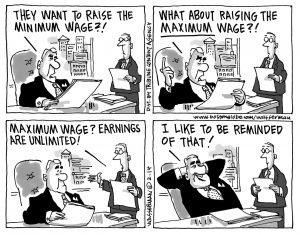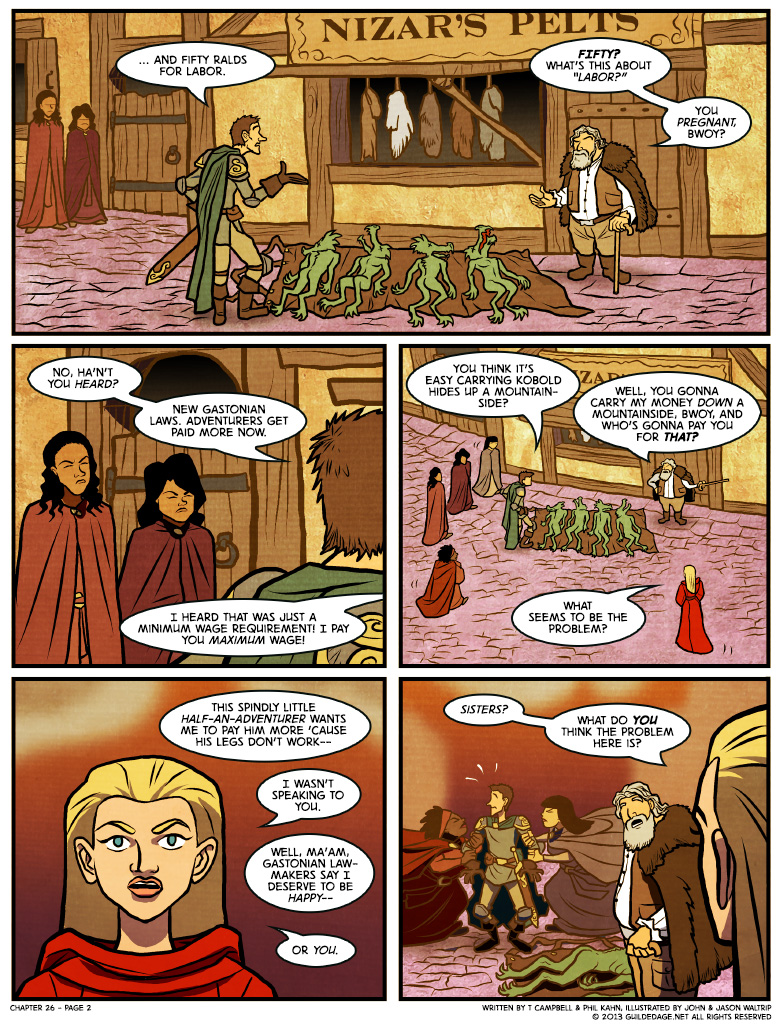Annotated 26-2
 In real life, I’m not a huge fan of price negotiation, especially at the freelance level. “I’m going to give you a number of dollars that this labor is worth to me, but that number could be a lie. Guess if it is, and if so, guess by how much.” Just quote me an honestly fair rate and I’ll decide if it’s worth my time, and let’s build a relationship from there. As an employer of artists, I generally do the same. Old-fashioned, I know, but it’s how my employers tend to deal, too.
In real life, I’m not a huge fan of price negotiation, especially at the freelance level. “I’m going to give you a number of dollars that this labor is worth to me, but that number could be a lie. Guess if it is, and if so, guess by how much.” Just quote me an honestly fair rate and I’ll decide if it’s worth my time, and let’s build a relationship from there. As an employer of artists, I generally do the same. Old-fashioned, I know, but it’s how my employers tend to deal, too.
I intended this as one of those actual “both sides” situations, with neither the adventurer nor his employer acting entirely honestly, but both their sins being fairly minor ones. Phil didn’t fight me on it, but I doubt he would’ve come up with it.
Showing dishonesty and/or greed from the have-nots, even if you also show it from the haves, can sometimes come across as endorsing the world as it is. At least we’re all equally grasping, right? The problem most of GA addresses, though, is that the greed of the rich has bigger consequences, and those consequences increase as the distribution of resources decreases.











I always just read these two as going about their business as normal. Sure, they may be bitching about labor and cost, but it’s not like they’re getting violent or asking for someone else to get involved. Who knows how it would have ended without the sisters, but nothing shown here makes me think either of the guys are in the wrong.
At least, I assumed the old guy is just a shopkeeper, and the adventurer is tying to unload some loot, not something like a quest or stated bounty. We’ve seen before the kolbold hides can have big price fluctuations, so haggling over the amount just struck me as normal, especially for a smaller town compared to the capital.
I don’t remember what came next but that’s actually racket right there, whatever they call themselves and whatever goals they pursue. Yeah, i think it goes haywire just about next page.
Personally, I feel that this situation is quite complex. We don’t know how much exactly 50 ralds is worth in comparison to a “hard” market. From the way it looks, my brain says it’s 50 cents, but logic dictates it that it HAS to be otherwise. If it’s more like 5 dollars, then yeah, 5 dollars in the current modern real world economy for hauling that many bodies up a mountain is small bonus, but if it’s more like 10 then that’s somewhat worthwhile and fair bonus.
This is of course, assuming that that town is actually on a mountain and is impossible via wagon or horse from that direction, AND that the shopkeeper wanted/would be expected to normally get the bodies in whole, not pre skinned, ether because he functions as the butcher’s intake, or, (at a lesser rate) because not every adventurer knows how to make pelts that would make the climb so much easier.
Baring those conditions, such as 50 ralds being 50 dollars, or the town only being on a tall rocky hill, then the “bonus” is indeed extortion, but my mind makes it hard to perceive/visually imagine this as such and it feels like this sisters are bullying him like enforcers.
This is why, in the real world, markets resort to things like basing price on weight or volume – it makes haggling a questionably-ethical or impossible act, comparatively, because you’ve standardized units of measure as being equivalent to units of value and everyone agrees on that rule, even if the demand (or lack thereof) for the good causes the proportion of its measure-to-value to change.
I think that getting into this is an excessive distraction from the narrative, which is probably why I don’t remember the plot going in that direction from here… but it is an important observation for this discussion, otherwise.
Charging for “labor” has always been problematic, because you can only measure it relative to the hardship experienced specifically by the laborer in question – so therefore, you can’t standardize its value in the same way I just described for goods. And if the goods they produce can vary in quality, then that also can be argued to alter the value… although if it does, then the good isn’t an ideal candidate for being sold by unit of measure in the first place.
Like you say, the situation is pretty complex. My top-of-mind solutions to the consequential debates include 1) introducing a currency that can only be used to pay for a service, while its counterpart can only be used for goods sold by UoM, and 2) reclassifying jobs based on whether they yield goods, goods AND services, OR just services as their product, as well as based on HOW the product is a necessity and to which segments of society, so that there is nothing more to debate about how we value anything.
I believe there have been previous attempts to implement the latter solution, but that doesn’t necessarily help without also implementing the former. Instead, most modern economies that I’m aware of value labor and goods differently by charging more for one than the other, and go a step further by considering an entire business enterprise to be a product in its own right (via the stock market).
This detaches the maintenance of institutions of commerce from the business that they do, facilitating both growth and overgrowth, and the latter especially, in the absence of proper regulation. Which is how we arrived at such a screwed-up place today.
In any case, the Sisters, here, are attempting to be regulators – which could be seen as bullying, depending on how it is done and whether or not their authority here is welcomed or expected. On the other hand, commerce can be seen as the means by which society functions, so from that perspective, functioning regularly can be seen as desirable, and so now it matters whether or not the Sisters are ultimately helping with that by enforcing regulation, and whether they are doing so properly.
There’s a lot that can be inferred, of course, from the reactions of those involved in this transaction, to this attempt at regulation. But the limit to that is whether the society they’re a part of has normalized regulation, or if perhaps instead it is a novel behavior. Which is an important thing for the people who make laws to consider.
If the Sisters are vigilante regulators, and I seem to recall that’s the case… well, this is gonna end badly for everyone.
Really the answer is either get a price commitment before you do the work, or take the best price you can get from the various people in town who might buy them.
And if nobody gives a good enough price to be worth the effort, well that just means everybody has enough kobold hides for now and maybe you should go kill something else for a while to spice it up…